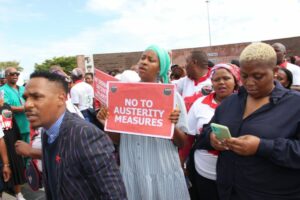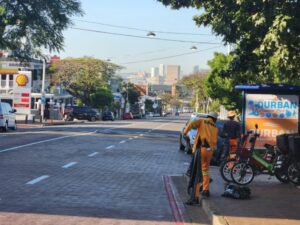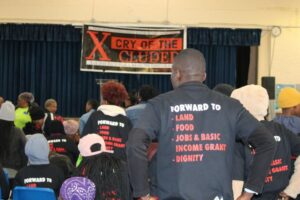The unions representing the striking Clover workers announced at a press conference on Monday that the workers have not been paid full bonuses as instructed by the Commission for Conciliation, Mediation and Arbitration (CCMA). According to GroundUp, the workers had through the CCMA managed to secure an agreement with the company to pay the overdue bonuses by Friday the 14th of January.
John Appolis, the general secretary of the General Industries Workers Union of South Africa (Giwusa), further qualified the union’s claim that the company disrespects the labour law of the country by refusing to pay the 13th cheque of workers. “From the payslips that we obtained from our members, someone who is earning R11,000 is supposed to get R11,000 bonus; they ended up getting about R300. The company has deducted what they call short-time strike action and that is the term they used on the payslip. In other words they have deducted the amount for the days they went on strike. Really, it is a punishment for the workers who went on strike,” he said. The strike started on the 22nd of November 2021 and the payment of bonuses was supposed to be on the 26th of November.
Siviwe Mafuya who started with the company in 2006 as a driver said that he was expecting a bonus of R11,000 but he got R1,098. “They told me that they deducted 171 hours that I did not work. The bonus doesn’t have anything to do with working hours. Our strike was no work no pay but what they have done is to deduct the money from the bonus. From what I can see they deducted from the day we went on strike to the day they got an instruction from CCMA to pay our bonuses (14 January). We were meant to meet for a picket today at CCMA but we couldn’t because we don’t have money to travel,” said Mafuya.
Giwusa will be challenging this: “Those magundwanes, the workers who were not on strike got their full bonuses on the 26th of November. Only the workers who were on strike are being punished. We know it is a tactic, a dirty trick on the part of Clover to do this to kill the morale of our members. But, they have miscalculated as we are more determined and more resolute,” Appolis said.
Outcome of the meeting with Minister of Trade and Industry
Zwelinzima Vavi, the general secretary of the South African Federation of Trade Unions (Saftu), said a meeting with the minister of trade and industry had been “constructive and cordial”. The trade union federation leader met with Ebrahim Patel to find a solution to the “onslaught against workers at Clover, including to put a moratorium on retrenchments, halting factory closures, expelling Milco and acquiring Clover on behalf of workers for democratic control and management with communities.”
Vavi told journalist that they reached common ground on three issues: “Firstly, the minister agreed with us that it cannot be in the interest of DTI, government and broader society to see people joining long queues of unemployment. Secondly, he agreed that they will look at whether the company misled the Competition Commission. DTI will approach competition authorities to launch an investigation on the breach of terms of merger. Thirdly, the minister will ensure that there is a direct discussion between the company and Giwusa. The discussions have not been taking place for a month now.”
Clover workers have been on strike for nine weeks.
The merger of Milco with Clover was approved by the Competition Commission on condition that jobs would be created. “The merger was agreed to despite workers’ objection based on solidarity with the Palestinian people. Clover has dismantled this project, meaning all 500 new jobs promised are gone. Project Sencillo (restructurings) has been brought forward and over 2,000 jobs have been lost. Further factory closures, relocations and restructurings add almost 1,500 more jobs on the chopping block,” said the unions.
The unions’ programme of action
The battle against MilcoSA and Clover is “just a tip of an iceberg. The attack on workers,” according to Vavi, “is a “reflection of the overall attack on the working class by both capitalists and the state.” He said that they believe that the moving of inland factories and to coastal towns is to make the factories more accessible to “moving of finished products from occupied territories of Palestine to South Africa”.
“We are en route to the same levels of unemployment that you see in Mozambique and Zimbabwe and to those that are starting xenophobic attacks, we are going to be in the same pot as our neighbours. You will find yourself in those countries looking for opportunities in a few years,” Vavi said.
Saftu sent a letter to the Congress of South African Trade Unions (Cosatu) and the Federation of Unions of South Africa (Fedusa) calling on them to support the Clover strike. “If they decide to side with the onslaught of workers through inaction, then history will judge them,” said Vavi.
The unions will be embarking on a national and international day of action on the 25th of January and intends to mobilise for an occupation of Clover, protests in shopping malls and targeting the Israeli embassy and companies.




